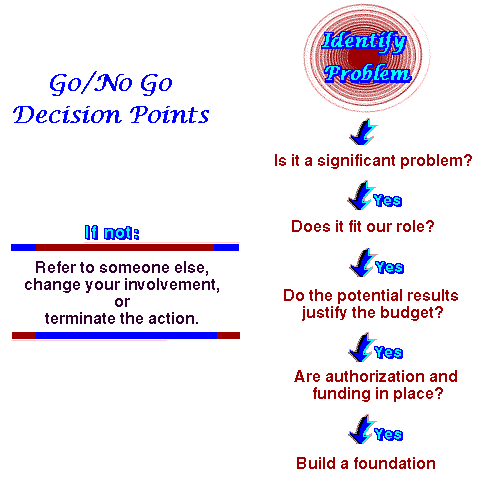| Before
Funding |
|
|
|
|
 |
|
|  Why? Why?
|
|
Reclamation needs to anticipate and address
problems as (if not before) they emerge. In this way, we can
solve problems before they become so entrenched that people
become polarized and actions can't be taken. The more extreme
the problem, the easier it is to get locked into extreme positions.
|
|
|
| 
|
| What may appear to be common sense,
even the meaning of the terms can often later lead to
misunderstandings unless they are clarified at the beginning
of the process. |
| 
|
|
|
Problems don't exist in a vacuum
but occupy a problemshed don't exist in a vacuum
but occupy a problemshed -- so solving
one problem is a little worse than useless if other problems
sabotage that solution. A holistic, coordinated approach is
often necessary to ensure that all solutions work together to
effectively meet interrelated needs. The problemshed's context
of related actions, influences, and concerns provides the background
against which the problem will be analyzed and in which the
solution will operate. -- so solving
one problem is a little worse than useless if other problems
sabotage that solution. A holistic, coordinated approach is
often necessary to ensure that all solutions work together to
effectively meet interrelated needs. The problemshed's context
of related actions, influences, and concerns provides the background
against which the problem will be analyzed and in which the
solution will operate. |
|
|
 |
|
|  Who Who
| 
|
| Funding for preliminary scoping is available
from several general funding authorities, depending on
the program. |
| 
|
|
|
Who should identify problems and get studies
started? Each person in every level and discipline has an opportunity
to identify problems and opportunities where Reclamation can
make a difference. Successful decisionmaking will provide a
forum for expressing these unique perspectives. Funding for
early problem identification and scoping of potential investigations
is usually available in general administrative accounts. In
the General Investigations budgets, for example, these activities
are funded by the Environmental and Interagency
Coordination Activities (EICA) or General Planning studies or General Planning studies
|
|
| |
Leaders identify and prioritize problems that
fulfill Reclamation's mission so that funds can be allocated
to solve them. Also, they decide how to work on problems (either
within a partnership, as a cooperating
agency, or as a lead agency). They follow up on problems that
don't fit Reclamation's role by referring
these problems to others.
This followup helps maintain relationships, trust, and credibility
with process participants, organizations, and other agencies.
Technical professionals are generally in the best position
to identify and address problems within the context of the current
situation. If you are dealing with a problem, you might look
for related problems and issues. When related needs are addressed,
solutions will be supported, the team will gain credibility,
and other groups will be more willing to work with the team.
Following up on these related needs will help ensure that the
existing processes and solutions continue to function.
|
|
|
 |
|
|  How How
|
|
Identifying the problem and determining Reclamation's
role does not necessarily entail actively addressing the problem.
We see if a problem is significant
and within our role. Then we choose to address or ignore it.
Ignoring the problem avoids the immediate cost of problem resolution
but may create more problems and incur more costs later on.
Addressing the problem entails the courage to implement the
alternative finally selected. Without that courage, we should
not begin the study.
|
|
|
| 
|
| Daily talk
to people "in the know" about problems you've identified.
|
| 
|
|
|
The flow chart below shows a checklist of
the go/no go decision points of getting started. decision points of getting started.

Go through these linked steps to ensure everything is in
place:
|
|
|
 |
|
|  Go On Go On
|
|
Executive
Summary Tour  Hurdles Chart <------>
Before Starting Hurdles Chart <------>
Before Starting |
|
| |
|
Process
Tour  Why bother? <------>
Before Starting Why bother? <------>
Before Starting |
|
| |
|

|
|